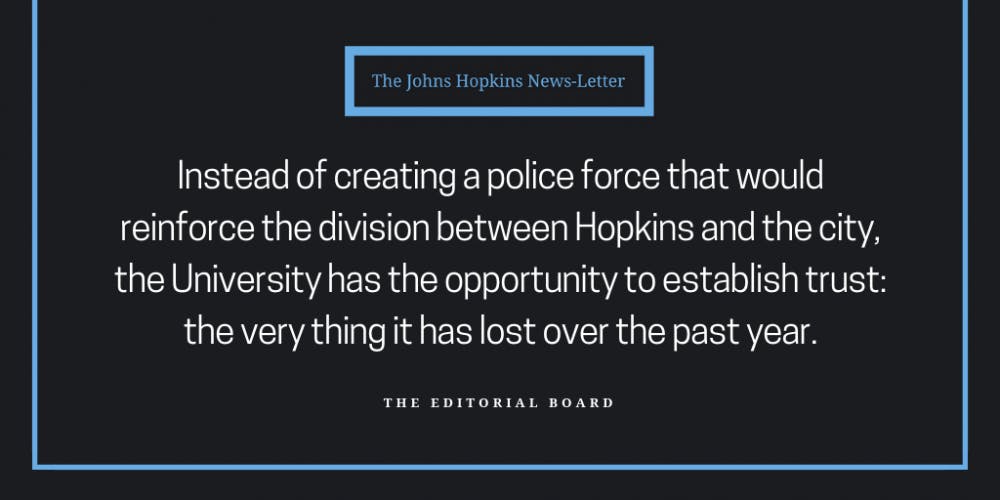Last week, Senator Antonio Hayes introduced a new bill in the Maryland General Assembly: the Community Safety and Strengthening Act. This bill, SB 793, and its correspondent in the Maryland House of Representatives, HB 1094, includes the University’s second bid for a private police force.
At first glance, this bill may seem promising; It proposes funding programs like the Children and Youth Fund, Mayor Catherine Pugh’s YouthWorks summer job programs and the Police Athletics League. These programs provide valuable opportunities for employment and career tracks in law enforcement for young people in our city.
Powerful voices have spoken out in favor of the bill, including alumnus and former New York Mayor Michael Bloomberg, Maryland Senate President Mike Miller, U.S. Representative Elijah Cummings and Mayor Catherine Pugh.
However, we at The News-Letter believe it is equally important to listen to those who oppose a Hopkins police force: particularly the voices of students and Baltimore residents who would be directly impacted by the proposal. In March 2018, our Editorial Board called on University officials to ask the community: “Should Hopkins even have a private police force?” We don’t believe that community members have been listened to when they’ve expressed their concerns. Several community associations in the neighborhoods surrounding Homewood Campus, including the Abell Improvement Association and the Greater Remington Improvement Association, voted to oppose the new bill.
In addition, many students have been busy mobilizing against the bill. Students Against Private Police continues to canvass and hold demonstrations. And while the University’s interim study on security states that “a clear majority were supportive of the 2018 legislation,” this majority is only 54 of 96 comments submitted online. Conversely, data collected from 1,879 respondents by the Student Government Association’s referendum shows that 74.76 percent do not want a private police force.
It’s perplexing that a singular bill is pairing a proposed police force that many oppose with youth funding which many support. We acknowledge that both law enforcement and an investment in young people are necessary to building a strong community. However, we do not support all of the provisions within SB 793 and HB 1094. We do not believe that enough has been done to establish trust with the community over which the proposed force would have jurisdiction.
Furthermore, the language of the bill indicates that the State of Maryland would be allocating funds to youth programs, not Hopkins. Granted, the University already uses some of its money to help surrounding communities. The Homewood Community Partners Initiative (HCPI), HopkinsLocal and Vision to Learn, are several initiatives that the University finances to support community members. But as a wealthy, tax-exempt institution with property in the city worth $49.1 billion, the University can do more. Instead of leveraging funding initiatives to convince people that a police force is necessary, the University should view funding youth and education programs as the more effective way to combat crime and violence. Students, Baltimore residents and University officials all agree that addressing the root causes of crime is an essential goal. Why not start there before introducing a contentious police force?
Lawmakers are still deliberating whether or not to support a Hopkins police force. So what can we do? Since legislators have the ability to endorse portions of bills, we can convince our representatives to solely support the sections that have both University and community support: funding for youth programs.
At the same time, we can continue to call on Hopkins to invest in solutions that have student and community backing. Members of the Hopkins and Baltimore community are concerned that the proposed police force could endanger the well-being and safety of marginalized groups. Instead of creating a police force that would reinforce the division between Hopkins and the city, the University has the opportunity to establish trust: the very thing it has lost over the past year.





